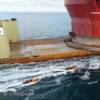A motorway under the sea between Britain and France was mooted last week in a study issued by Eurotunnel Plc on a second cross-channel link. Almost 200 years after a Channel road link was first presented to Napoleon by French engineer Albert Mathieu, Eurotunnel's study envisages cars zooming along a four-lane highway. But with the existing rail tunnel struggling to make money, a new one may never happen.
Millions of passengers, cars and trucks have sped underwater since Britain's Queen Elizabeth and President Francois Mitterrand opened the Channel Tunnel in 1994. By launching a road link, Eurotunnel could cut car journey times by half, analysts said. Under its original concession agreement, Channel Tunnel operator Eurotunnel had until 2000 to submit a study for a second road link.
The study submitted in December featured two proposals: a second rail link and the 30-mile road tunnel, which would be the longest underwater motor link in the world. Eurotunnel must decide whether to back a second tunnel before 2010.
"It will be a question of years before we decide," a company spokesman said. "This document is a study to comply with the concession, it is not a formal presentation to the governments," she added.
A Distant Pipe Dream?
Analysts saw a second tunnel as a distant pipe dream, saying Eurotunnel must first boost the profitability of the existing tunnel. Eurotunnel had a shaky start, struggling with an eight billion pound debt mountain.
Last March, it reported its first annual profit since flotation in 1987, but is still saddled with debts that it says will not be cleared until 2005.
Total operating revenue for the third quarter of 1999 declined by eight percent to 145 million pounds when the end of duty free sales dampened car and coach traffic.
Transport analysts agreed the company's beleaguered finances will overshadow any plans to develop a second tunnel. "Eurotunnel is limping along at the moment. There's still a long way to go to make the existing tunnel viable," Richard Hannah, transport analyst at Deutsche Bank, said.
"Building a new tunnel would just extract much needed capital and volume from the first one," he added. In a statement on the second link study, Patrick Ponsolle, Eurotunnel Executive Chairman, said: "Eurotunnel would only embark on such a venture if it would enhance the profitability of the company and was in the interest of the shareholders."
Finances aside, the single bore two-level road link would also pose a range of safety issues for the company. In a road tunnel, car exhaust fumes pose one hazard, while the dangers of breakdowns and accidents are increased, an analyst said.
"It's an unknown quantity," he said, adding that thorough research would be needed. In November 1996 a fire injured more than 30 people and halted channel tunnel traffic for 15 days, leaving a permanent blemish on Eurotunnel's safety record. - (Reuters)
Subscribe for
Maritime Reporter E-News
Maritime Reporter E-News is the maritime industry's largest circulation and most authoritative ENews Service, delivered to your Email five times per week













